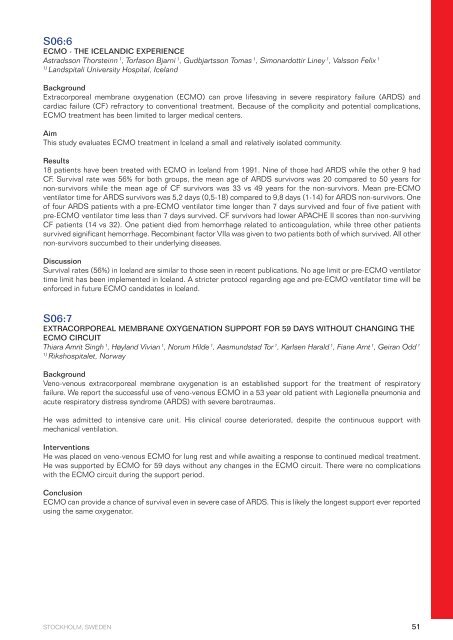SATS 2009 Final Program - Scandinavian Association for Thoracic ...
SATS 2009 Final Program - Scandinavian Association for Thoracic ...
SATS 2009 Final Program - Scandinavian Association for Thoracic ...
You also want an ePaper? Increase the reach of your titles
YUMPU automatically turns print PDFs into web optimized ePapers that Google loves.
S06:6<br />
ECMO - THE ICELANDIC EXPERIENCE<br />
Astradsson Thorsteinn 1 , Torfason Bjarni 1 , Gudbjartsson Tomas 1 , Simonardottir Liney 1 , Valsson Felix 1<br />
1) Landspitali University Hospital, Iceland<br />
Background<br />
Extracorporeal membrane oxygenation (ECMO) can prove lifesaving in severe respiratory failure (ARDS) and<br />
cardiac failure (CF) refractory to conventional treatment. Because of the complicity and potential complications,<br />
ECMO treatment has been limited to larger medical centers.<br />
Aim<br />
This study evaluates ECMO treatment in Iceland a small and relatively isolated community.<br />
Results<br />
18 patients have been treated with ECMO in Iceland from 1991. Nine of those had ARDS while the other 9 had<br />
CF. Survival rate was 56% <strong>for</strong> both groups, the mean age of ARDS survivors was 20 compared to 50 years <strong>for</strong><br />
non-survivors while the mean age of CF survivors was 33 vs 49 years <strong>for</strong> the non-survivors. Mean pre-ECMO<br />
ventilator time <strong>for</strong> ARDS survivors was 5,2 days (0,5-18) compared to 9,8 days (1-14) <strong>for</strong> ARDS non-survivors. One<br />
of four ARDS patients with a pre-ECMO ventilator time longer than 7 days survived and four of five patient with<br />
pre-ECMO ventilator time less than 7 days survived. CF survivors had lower APACHE II scores than non-surviving<br />
CF patients (14 vs 32). One patient died from hemorrhage related to anticoagulation, while three other patients<br />
survived significant hemorrhage. Recombinant factor VIIa was given to two patients both of which survived. All other<br />
non-survivors succumbed to their underlying diseases.<br />
Discussion<br />
Survival rates (56%) in Iceland are similar to those seen in recent publications. No age limit or pre-ECMO ventilator<br />
time limit has been implemented in Iceland. A stricter protocol regarding age and pre-ECMO ventilator time will be<br />
en<strong>for</strong>ced in future ECMO candidates in Iceland.<br />
S06:7<br />
EXTRACORPOREAL MEMBRANE OXYGENATION SUPPORT FOR 59 DAYS WITHOUT CHANGING THE<br />
ECMO CIRCUIT<br />
Thiara Amrit Singh 1 , Høyland Vivian 1 , Norum Hilde 1 , Aasmundstad Tor 1 , Karlsen Harald 1 , Fiane Arnt 1 , Geiran Odd 1<br />
1) Rikshospitalet, Norway<br />
Background<br />
Veno-venous extracorporeal membrane oxygenation is an established support <strong>for</strong> the treatment of respiratory<br />
failure. We report the successful use of veno-venous ECMO in a 53 year old patient with Legionella pneumonia and<br />
acute respiratory distress syndrome (ARDS) with severe barotraumas.<br />
He was admitted to intensive care unit. His clinical course deteriorated, despite the continuous support with<br />
mechanical ventilation.<br />
Interventions<br />
He was placed on veno-venous ECMO <strong>for</strong> lung rest and while awaiting a response to continued medical treatment.<br />
He was supported by ECMO <strong>for</strong> 59 days without any changes in the ECMO circuit. There were no complications<br />
with the ECMO circuit during the support period.<br />
Conclusion<br />
ECMO can provide a chance of survival even in severe case of ARDS. This is likely the longest support ever reported<br />
using the same oxygenator.<br />
STOCKHOLM, SWEDEN 51


